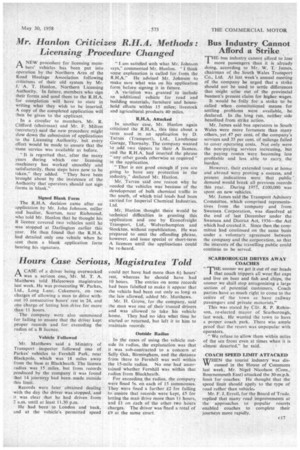Mr. Hanlon Criticizes R.H.A. Methods : Bus Industry Cannot
Page 55

If you've noticed an error in this article please click here to report it so we can fix it.
Licensing Procedure Changed
Afford a Strike
A NEW procedure for licensing mem
bers' vehicles has been put into operation by the Northern Area of the Road Haulage Association following criticisms of their old system by Mr. J. A. T. Hanlon, Northern Licensing Authority. In future, members who sign their forms and send them to the R.H.A. for completion will have to state in writing what they wish to be inserted.
A copy of the completed application will then be given to the applicant.
In a circular to members, Mr. R. Clifford (chairman) and Mr. F. Milton (secretary) said the new procedure might slow down the submission of applications to the Licensing Authority, but every effort would be made to ensure that the same service was available as before.
"It is regretted that, after the many years during which our licensing machinery has worked smoothly and satisfactorily, these steps have now to be taken," they added. " They have been brought about by the insistence of the Authority that operators should not sign forms in blank."
Signed Blank Form The R.H.A. decision came after an application by Mr. John Johnson, miller and haulier, Scorton, near Richmond, who told Mr. Hanlon that he thought his B licence covered two vehicles until he was stopped at Darlington earlier this year. He then found that the R.H.A. had detailed only one vehicle when he sent them a blank application form bearing his signature. "I am satisfied with what Mr. Johnson says," commented Mr. Hanlon. 1 think some explanation is called for from the R.H.A." He advised Mr. Johnson to make sure what was on his application form before signing it in future.
A variation was granted to include an additional vehicle for road and building materials, furniture and household effects within 15 miles; livestock and agricultural products 40 miles.
ILILA. Attacked In. another case, Mr. Hanlon again criticized the R.H.A., this time about a term used in an .application by D. Tarren (Transport),. Ltd., Lanehouse Garage, Thornaby. The company wanted to add two tippers to their A licence, and the R.H.A. had inserted the phrase "any other goods otherwise as required" in the application.
"That is not good enough if you are going to have any protection in the industry," declared Mr. Hanlon.
. Mr. Tanen said one reason why he needed the vehicles was' because of the development of bulk chemical traffic in the south, of which trial loads had been carried for Imperial Chemical Industries, Ltd.
Mr. Hanlon thought there would be technical difficulties in granting this application and one by Econofreight Transport, Ltd., Wolverhampton and Stockton. without republication. He was prepared to omit the offending phrase, however, and issue special or short-term A licences until the applications could be re-heard. THE bus industry cannot afford to lose more passengers than it is already doing, according to Mr. W. T. James, chairman of the South Wales Transport Co, Ltd. At last week's annual meeting of the company he urged that a strike should not be used to settle differences that might arise out of the provincial busmen's present claim for higher wages.
It would be folly for a strike to be called when. constitutional means for settling problems were available, he declared. In the long run, neither side benefited from strike action.
Mr. James said. bus operators in South Wales were more fortunate than many others, yet 47 per cent, of the company's services and 35 per cent, of mileage failed to cover operating costs. Not only were the non-paying services increasing, but the paying routes were becoming less profitable and less able to carry the burden.
However, their extended tours at home • and abroad were proving a success, and present indications were that public' demand would break all previous records this year. During 1957, £100,000 was' spent on new vehicles.
Mr. James said the Transport Advisory Committee, which comprised representatives from the company and from Swansea Corporation, was dissolved at the end of last December under the Swansea and District Act, 1936—the Act which had created it. Since then the committee had continued on the same basis under a voluntary agreement between the company and the corporation, so that the interests of the travelling public could continue to be served.




























































































































